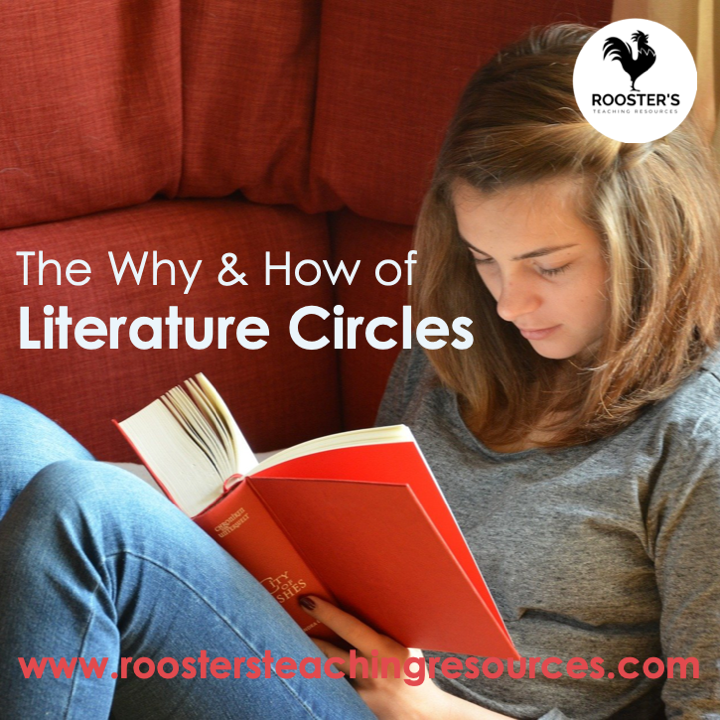
The Why and How of Literature Circles

There are probably as many ways to do literature circles as there are teachers, and over time, I have worked out my own formula for conducting these small, peer-led discussion groups.
Why Use Literature Circles?

Literature circles have withstood the test of time. The research continues to show that literature circles have a significant impact on reading comprehension and reading motivation. Furthermore, this mode of learning incorporates oral language, readily adapts to differentiation, promotes a positive classroom climate, and is based on cooperative learning. So not only are literature circles teaching the skills of literacy, but they also help young people learn the principles of civil and productive communication.
Furthermore, I find the student writing produced in the literature circle process to have more voice and to be more critical. Here are a few examples of what I mean from 7th grade student work.

Student Commentary on Author's Craft, The Night the Bed Fell by James Thurber
“James Thurber’s choice of words adds to the humor to “The Night the Bed Fell” by choosing words that sound comical. Not many people know what verisimilitude means, but they might laugh because for some odd reason people laugh at big words they can’t even spell or know the meaning of. … He also says that “his cousin was not the only one in his family with ‘crotchets’.” These are only some of the goofy words that James picks for his essay. …”
Portion of Student Answer to the question “What did Orwell learn about himself from the “tiny incident” involving the elephant?” for Shooting an Elephant by George Orwell
“… This story will blow you away [and then] make you come back with a sad ending. … [What] Orwell learns about himself is that it is hard to be pressured. … Orwell was pressured too much … by the people in Burma … and BAM the elephant was shot. …[Human] nature can only take so much. … Orwell discovers that imperialism is extremely bad… Britain invaded Burma and … Britain became a tyrant. The incident also teaches … that if you shoot or get shot in the wrong place, you will have a painful time. …[In] other words, take your time and think.”
Part of Student Summary for Dr. Jekyll and Mr. Hyde by Robert Louis Stevenson
“After everything that happened in chapters 3, 4 and 5, Utterson sees that Jekyll is involved with the problem of Mr. Hyde. Jekyll hasn’t changed a bit. He’s still throwing parties and still acting like his normal self…”
The Two Main Problems with Literature Circles –
Reading Choice and Unprepared Students

My early experimentation with literature circles was disastrous. Students chose their own novels and met for discussion, but at times I wasn’t even sure if they had actually read the material. Although I gave guidelines, I also realized that I had not given students enough training in how to actually hold a good discussion.
So, I went back to the drawing board, and instead of throwing the baby out with the bathwater, I decided that there were three things that needed to change.
1. Have all students read the same novel. Although choice is an important aspect in a person’s development, I did not feel that I could adequately manage literature circles in which students chose their own books.
2. Teach and model the skills needed to hold a productive meeting.
3. Include reflection in my literature circle plan so that the plan could continually improve.
Here Are My Recommendations on How to Conduct Literature Circles -
It's All in the Setup!

1. Schedule. Now that everyone is reading the same book and literally on the same page, schedule assignments and meeting times. A 3-4 week cycle for a novel works well - the first week being the introduction and the modeling for the discussions, and the other two to three being scheduled meeting times. Stagger the meetings so that not all groups meet at the same time. Schedule the due date for the assigned written response into this calendar, before students meet. Students who have not done the written homework are not allowed to meet.
2. Grouping. Take student preferences into account when grouping but also aim to make diverse groups.
3. Discussion Logs or Jobs? Although I have used assigned roles or jobs effectively, I much prefer to use a tool I have named a “Discussion Log” in which everyone does the same assignment. This log includes a summary, student-generated vocabulary, a question, and a choice of writing about several of the items typically found in the job assignments – predictions, observations, clarifications and connections.
4. Model. Show students how to write a discussion log or complete the jobs by reading the first chapter aloud, taking notes, and doing the assignment for the first chapter of the book with the class. Then, assign a practice assignment in which they do the same for chapters 1-2 of the novel. Do not grade this assignment; rather, give students feedback on how to improve or on what they did well.
5. Structure. Provide students a structure with an order of how to conduct literature circles with question prompts in case they get stuck and guidelines on listening and speaking. As a class, discuss guidelines such as being clear on your purpose, courtesy, and to remember to not take a difference of opinion personally.

6. Fishbowl Discussion. As part of the setup, select outgoing students to hold a discussion on the first two chapters while the rest of the class watches. Then, have the class critique the discussion. What went well? What didn’t? How could this discussion have been improved?
7. Teacher Guiding Questions. Incorporate Teacher Guiding Questions and Vocabulary into the meetings. This ensures that students are really following the story, are hitting a variety of vocabulary, and are touching upon themes and author’s craft. Students are instructed to use these after their own contributions.

8. Volunteers. Literature Circles provide a great opportunity for the use of parent volunteers, especially for younger students. If volunteers are available, give them the schedule and handouts and invite them in to help participate or just observe a discussion. This is especially helpful with younger groups of students. If there is enough outside help, you may opt to change up the schedule and have the meetings all at the same time. I also like to employ students who are not meeting to help. These students observers do not participate but just observe the discussion. In my experience, the student observers offer the most candid insight into how the group discussion went.
9. Test. Give a book test or a vocabulary test after the literature circles are completed. Students should know this ahead of time to help keep them accountable.
10. Reflection. Include a rubric for students to complete at the end of their discussion and sometimes require a follow-up question - either posed by a student or by you - to be answered in writing. At the end of a literature circle cycle, hold a debriefing and ask the students questions like the following: Did you like approaching literature in this way? What problems did you encounter? What would make future literature circles more effective? Use this feedback in organizing future literature circles.

It’s definitely work to set it up, but once things are in place and students know the expectations, it’s like dominoes. There is a sweet satisfaction in sitting back and seeing the learning fall into place.
If you use literature circles, please share insights or a link on what has worked for you and/or the challenges you have faced.
©Tuiolosega 2019





